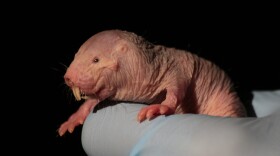Rae Ellen Bichell
Rae Ellen Bichell is a reporter for NPR's Science Desk. She first came to NPR in 2013 as a Kroc fellow and has since reported Web and radio stories on biomedical research, global health, and basic science. She won a 2016 Michael E. DeBakey Journalism Award from the Foundation for Biomedical Research. After graduating from Yale University, she spent two years in Helsinki, Finland, as a freelance reporter and Fulbright grantee.
-
Sonia Vallabh knows that by the time she's middle-aged, a rare inherited disease will likely start killing off her brain cells. She and her husband have become scientists to try to stop the disease.
-
The small spacecraft is set to hurtle toward the sun at about 450,000 miles per hour. Scientists hope it will clear up some big mysteries, such as why the sun's atmosphere is hotter than its surface.
-
The hairless, ground-dwelling, cold-blooded rodents have proven capable of surviving total oxygen deprivation. Their odd biology allows them to run on an alternative fuel.
-
Researchers found that a protein in human umbilical cord plasma improved learning and memory in older mice, but there's no indication it would work in people.
-
Eels sometimes swim thousands of miles from their birthplace in the Atlantic to rivers and lakes where they live. Researchers say the creatures might use the Earth's magnetic field to find their way.
-
They're the Godzillas of the virus world, pushing the limit of what is considered alive. Researchers are trying to figure out where they came from. (And no, they aren't known to make people sick.)
-
Researchers following a group of New Zealanders over the course of 40 years found an association between childhood lead exposure and declines in intelligence and socioeconomic status later in life.
-
After six weeks of training, people could memorize twice as much. Areas of the brain had begun communicating in new ways — a lot like what happens inside the heads of world memory champions.
-
They don't have wings, but bacteria sure can fly. Researchers at MIT say that tiny bubbles trapped by raindrops play a part in launching bacteria on long-distance flights.
-
U.S. emissions of smog-forming pollutants have dropped, but smog levels in the western U.S. have increased each year. Now, researchers say, they've found out why — it's wafting from across the Pacific Ocean.








